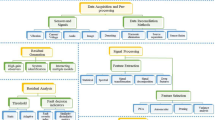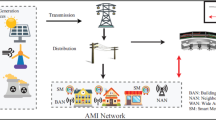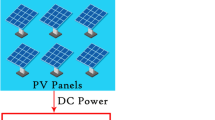Abstract
Power quality disturbances (PQDs) commonly occur in large-scale power systems and networks that rise critical issues. Therefore, an automated recognition and mitigation of PQDs is necessary. In this scenario, an efficient adaptive rate technique is proposed for viable features mining and recognition of PQDs. Event-driven A/D converters (EDADCs) are used to acquire PQD signals. To accurately segment the sampled signal, an appealing approach is used. A time-domain evaluation is carried out in the next phase to investigate the characteristics of these fragments. The mature machine learning algorithms are employed to carry out the classification. Compared to conventional counterparts, the findings indicate a decrease of 13.26 times in collected information. An average maximum identification precision of 99.33% is achieved by the proposed method. Compared to predecessors, this confirms the considerable performance of the processing and power usage of the engineered solution while achieving high recognition accuracy.


Similar content being viewed by others
References
Van den Broeck G, Stuyts J, Driesen J. A critical review of power quality standards and definitions applied to DC microgrids. Appl Energy. 2018;229:281–8.
Kumar V, Pandey AS, Sinha SK. Grid integration and power quality issues of wind and solar energy system: a review. Int Conf Emerg Trends Electr Electron Sustain Energy Syst (ICETEESES). 2016;2016:71–80.
Rönnberg S, Bollen M. Power quality issues in the electric power system of the future. Electr J. 2016;29(10):49–61.
Ali ND, Zakri AA. Identifying characteristic of power quality problems on solar electric power generation. Int J Electr Energy Power Syst Eng. 2018;1(2):7–10.
Latran MB, Teke A, Yoldaş Y. Mitigation of power quality problems using distribution static synchronous compensator: a comprehensive review. IET Power Electron. 2015;8(7):1312–28.
Thapar A, Saha TK, Dong ZY. Investigation of power quality categorisation and simulating it’s impact on sensitive electronic equipment. IEEE Power Eng Soc General Meet. 2004;1:528–33. https://doi.org/10.1109/PES.2004.1372855.
R. A. Flores, “State of the art in the classification of power quality events, an overview,” in 10th International Conference on Harmonics and Quality of Power. Proceedings (Cat. No. 02EX630), 2002, vol. 1, pp. 17–20.
Kow KW, Wong YW, Rajkumar RK, Rajkumar RK. A review on performance of artificial intelligence and conventional method in mitigating PV grid-tied related power quality events. Renew Sustain Energy Rev. 2016;56:334–46.
Borges FA, Fernandes RA, Silva IN, Silva CB. Feature extraction and power quality disturbances classification using smart meters signals. IEEE Trans Ind Inform. 2015;12(2):824–33.
Elphick S, Smith V, Gosbell V, Perera S, Ciufo P, Drury G. Characteristics of power quality disturbances in Australia: voltage dips at low-voltage sites. IET Gener Transm Distrib. 2015;9(15):2382–8.
R. Igual, C. Medrano, F. J. Arcega, and G. Mantescu, “Integral mathematical model of power quality disturbances,” in 18th International Conference on Harmonics and Quality of Power (ICHQP) 2018, pp. 1–6.
Mahela OP, Shaik AG, Gupta N. A critical review of detection and classification of power quality events. Renew Sustain Energy Rev. 2015;41:495–505.
Khokhar S, Zin AABM, Mokhtar ASB, Pesaran M. A comprehensive overview on signal processing and artificial intelligence techniques applications in classification of power quality disturbances. Renew Sustain Energy Rev. 2015;51:1650–63.
Hossain E, Tür MR, Padmanaban S, Ay S, Khan I. Analysis and mitigation of power quality issues in distributed generation systems using custom power devices. IEEE Access. 2018;6:16816–33. https://doi.org/10.1109/ACCESS.2018.2814981.
V. K. Ingle and J. G. Proakis, Digital signal processing using matlab: a problem solving companion. Cengage Learning, Boston, MA, 2016.
Qaisar SM. Efficient mobile systems based on adaptive rate signal processing. Comput Electr Eng. 2019;79(106462):2019.
Mina Qaisar S, Sidiya D, Akbar M, Subasi A. An event-driven multiple objects surveillance system. Int J Electr Comput Eng Syst. 2018;9(1):35–44.
S. M. Qaisar, L. Fesquet, and M. Renaudin, “Effective resolution of an adaptive rate ADC,” in 8th International Conference on Sampling Theory and Applications (SAMPTA’09), Marseille, France, 2009.
Qaisar SM, Subasi A. Cloud-based ECG monitoring using event-driven ECG acquisition and machine learning techniques. Phys Eng Sci Med. 2020;43(2):623–34.
Mian Qaisar S. Signal-piloted processing and machine learning based efficient power quality disturbances recognition. PLoS ONE. 2021;16(5):e0252104.
S. M. Qaisar and S. F. Hussain, “An effective arrhythmia classification via ECG signal subsampling and mutual information based subbands statistical features selection,” J. Ambient Intell. Humaniz. Comput. 2021. https://doi.org/10.1007/s12652-021-03275-w.
H. Ian, E. Frank, M. Hall, and J. Christopher, “Data mining: Practical machine learning tools and techniques—Part II: More advanced machine learning schemes.” Morgan Kaufmann, Burlington, MA, 2017.
Moser BA, Lunglmayr M. On quasi-isometry of threshold-based sampling. IEEE Trans Signal Process. 2019;67(14):3832–41.
R. Gandhi, “Support Vector Machine — Introduction to Machine Learning Algorithms,” Medium, Jul. 05, 2018. https://towardsdatascience.com/support-vector-machine-introduction-to-machine-learning-algorithms-934a444fca47 Accessed Apr 08, 2020.
Suthaharan S. Machine learning models and algorithms for big data classification. Integr Ser Inf Syst. 2016;36:1–12.
A. Sabo and S. M. Qaisar, “The event-driven power efficient wireless sensor nodes for monitoring of insects and health of plants,” in 3rd International Conference on Signal and Image Processing (ICSIP), 2018, pp. 478–483.
Mian Qaisar S. Event-driven coulomb counting for effective online approximation of Li-ion battery state of charge. Energies. 2020;13(21):5600.
Qaisar SM. Baseline wander and power-line interference elimination of ECG signals using efficient signal-piloted filtering. Healthc Technol Lett. 2020;7(4):114–8.
Funding
This project is funded by Effat University, Jeddah, KSA under the Grant number UC#9/29 April.2020/7.1-22(2)3.
Author information
Authors and Affiliations
Corresponding author
Ethics declarations
Conflict of interest
The authors declare that they have no conflict of interest.
Additional information
Publisher's Note
Springer Nature remains neutral with regard to jurisdictional claims in published maps and institutional affiliations.
This article is part of the topical collection “Intelligent Systems” guest edited by Geetha Ganesan, Lalit Garg, Renu Dhir, Vijay Kumar and Manik Sharma.
Rights and permissions
About this article
Cite this article
Mian Qaisar, S., Alyamani, N., Waqar, A. et al. Machine Learning with Adaptive Rate Processing for Power Quality Disturbances Identification. SN COMPUT. SCI. 3, 14 (2022). https://doi.org/10.1007/s42979-021-00904-1
Received:
Accepted:
Published:
DOI: https://doi.org/10.1007/s42979-021-00904-1




